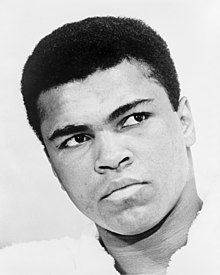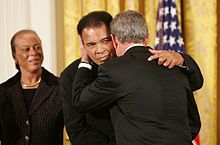User:Ahmad Abazeed school/sandbox
Muhammad Ali[edit]
Introduction[edit]

He floats like a butterfly and stings like a bee, he is the greatest of all time, Muhammad Ali. Muhammad Ali is a heavyweight champion boxer and is recognized as one of the greatest athletes in the 20th century. An Olympic gold medalist with a record of 56 wins and 5 losses, Muhammad Ali was the first boxer to capture the heavyweight title 3 times in his boxing career. Not only was he a boxer, but his outspokenness on issues of race, religion, and politics made him a very controversial figure in his time. The following biography will be discussing Muhammad Ali’s early life, his greatest achievements throughout his career, his challenges and struggles, and his life after his retirement.
Early Life[edit]
Born on January 17, 1942, in Louisville, Kentucky. Cassius Marcellus Clay Jr. started his boxing career in somewhat of a coincidence. When his beloved red-and-white Schwinn bicycle got stolen, he was furious to find out who stole his bicycle. He reported his incident to a police officer and said that he will do anything to find the thief and beat him up. The police officer Joe Martin, who fortunately trained boxers in his spare time, suggested that he will train and tutor Cassius to become a professional boxer and be able to beat up the thief. And from then, the legacy of Cassius started.
After graduating high school, Clay traveled to Rome to compete in the 1960 Summer Olympics, in which he won the light heavyweight gold medal. Devastating his opponents with his combination of quick, powerful jabs and foot speed, the 6-foot-3-inch heavyweight earned the nickname “Louisville Lip.”
His First Heavyweight Title[edit]
After winning 19 fights, including 15 knockouts, Clay received his first title shot on February 25, 1964, against the heavyweight champion Sonny Liston. 22-year-old Clay continuously teased Liston before the fight, promising to knock him out. After not being able to answer the bell on the 7th round, Liston lost to Clay 7-1. Clay was then announced as the new heavyweight champion of the world with his saying, “I am the greatest.”
Conversion to Islam[edit]
Clay later confirmed his interest in Islam after being seen around Miami with controversial Nation of Islam member Malcolm X for a while. Soon enough, Clay had confirmed the rumors about his conversion to Islam on March 6, 1964, where Elijah Muhammad presented on Clay the name of Muhammad Ali.
Vietnam War[edit]
Citing his religious beliefs, Ali refused to serve the U.S. Armed Forces in the Vietnam war on April 28, 1967. This caused him to get arrested and the New York State Athletic Commission immediately suspended his boxing license and revoked his heavyweight belt. Ali was sentenced to 5 years in prison and a $10,000 fine, but fortunately, he remained free while the conviction was appealed. While he was banned from boxing for 3 years, Ali spoke out against the Vietnam war and as public attitudes turned against the war, support for Ali grew.
His Greatest Fights[edit]
Ali returned to the ring on October 26, 1970, after 43 months in exile. Ali got the chance to regain his heavyweight title in a match against Joe Frazier in what was billed as the “Fight of the Century.” Ali lost in a unanimous decision by the undefeated Frazier who floored Ali with a hard left hook in the final round. Ali was not going away without a rematch, so on January 28, 1974, a rematch between Muhammad Ali and Joe Frazier occurred. Muhammad Ali won the rematch in a split decision and gained his revenge against Frazier.
Ali’s victory against Joe Frazier gave him a title shot against the champion George Foreman. The fight was dubbed the “Rumble in the Jungle” and was held in Kinshasa, Zaire on October 30, 1974. Although Foreman was considered as one of the hardest hitters in boxing, Ali had a strategy in his mind. Ali used his “rope-a-dope” strategy, leaning on the ring ropes and absorbing all of Foreman’s blows while waiting for him to tire. This strategy allowed Ali to get the upper hand and beat Foreman, winning his heavyweight title once again.
On February 15, 1978, Ali lost his title to Leon Spinks in a 15-round split decision. Ali defeated Leon Spinks 7 months later in a unanimous 15-round decision to reclaim his heavyweight crown and become the first fighter to ever win the world heavyweight title on 3 separate occasions.
Ali announced his retirement in 1979 but came back a year later to the ring once again to fight against Larry Holmes. However, Ali was devastated in a technical knockout loss to Holmes. Ali was then defeated again in a 10-round decision to Trevor Berbick on December 11, 1981. After the fight, the 39-year-old Ali retired for good with a career record of 56 wins, five losses, and 37 knockouts.
Life After Retirement[edit]

Ali was diagnosed with Parkinson’s syndrome in 1984, which was probably caused by severe head trauma throughout his boxing career. Ali’s boxing skills started fading away and his ability to communicate became limited. Despite Parkinson’s, Ali continued living his life as a philanthropist and social activist, traveling the world to make humanitarian, goodwill, and charitable appearances. Ali was awarded the Presidential Medal of Freedom in a 2005 White House ceremony. Ali was also named by Ring Magazine as “Fighter of the Year” five times, more than any other boxer, and he was inducted into the International Boxing Hall of Fame in 1990. Ali died at the age of 74 on June 3, 2016.
Conclusion[edit]
In conclusion, Muhammad Ali’s legacy will stay as a part of history. Either it was him boxing and defending his title, or being a social activist and helping others, Muhammad Ali is an inspiration to many people and a role model to young boxers. After discussing his significant achievements and greatest challenges, I think it is safe to say that Muhammad Ali is one of the greatest athletes to ever step foot in a ring.
References[edit]
https://www.biography.com/athlete/muhammad-ali
https://www.britannica.com/biography/Muhammad-Ali-boxer
